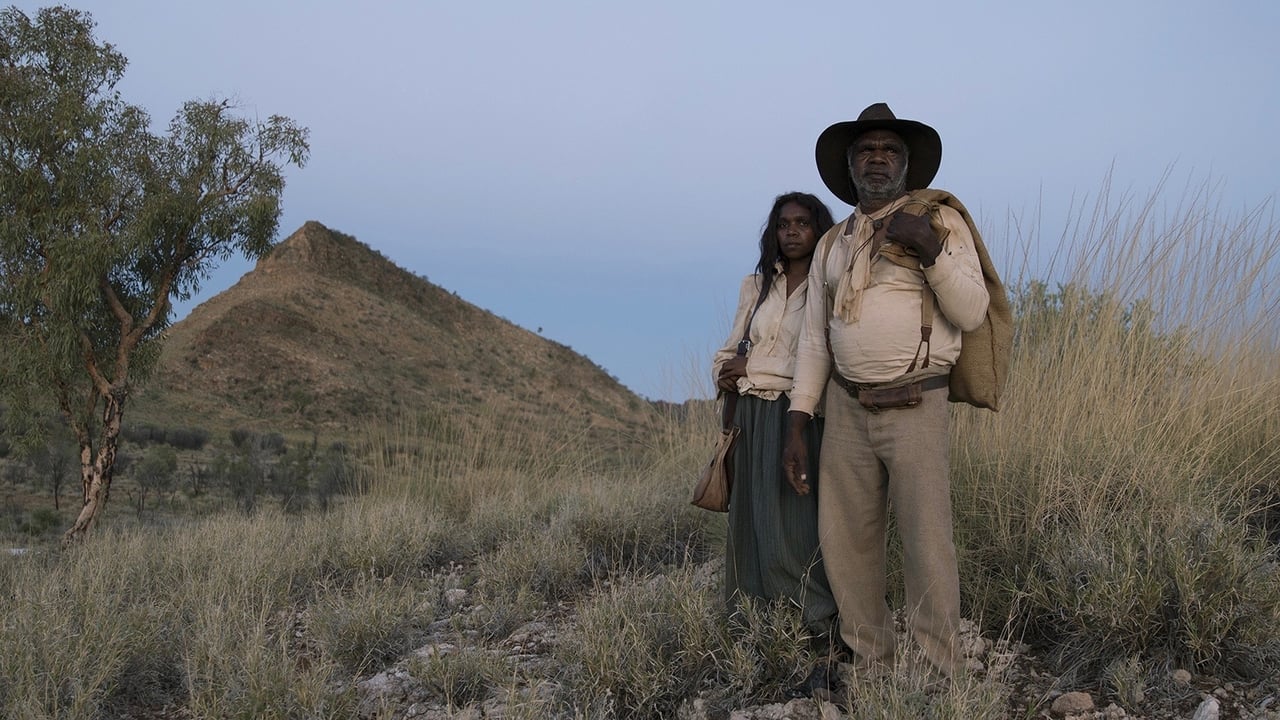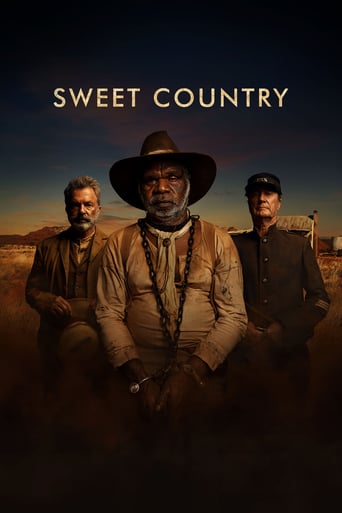

The movie has a familiar story and simple dialogue, and this is not a problem by any means, yet it's technically impressive. Sweet Country is a visually stunning film. The cinematography in this movie is similar to Mudbound's, but it's even more beautiful! Actually, it has the best cinematography of the year, so far! And while the movie looks poetic, the same goes for the storytelling. It reminded me of Days of Heaven. As a matter of fact, you may feel if you're watching a Terrence Malick film, except it's more fast-paced. The similarity between Sweet Country and Malick's movies don't stop there. As Warwick Thornton used symbolism in Sweet Country in a way that resembles Malick's use of symbolism. By that I mean the use of allegories and symbols in a beautiful way that feels literary or poetic. Unfortunately, the use of symbols in Sweet Country often feels superfluous, and completely unnecessary. Sweet Country is masterly edited, and I think that what makes it very watchable, and often enjoyable despite its poetic style that may indispose some people.Thornton used intercut flash-forwards and flashbacks heavily. And while sometimes they help us understanding some events that happened, or will happen, therefore build tension, they often seem like nothing but artistic frippery, specially when they are used to make the movie seem if it has a non-linear storytelling. Sweet Country also should be praised for its non-sentimental approach to its message. Unlike other movies that tackle the same subject matter, Sweet Country doesn't dramatize any aspect of its story. The movie even doesn't have a soundtrack, and that makes it feel more realistic. The movie relies on its bleak and dreary atmosphere to imply its subject matter and moral instead of presenting them in the usual manner. All the performances are good. Hamilton Morris' performance is impressive because it feels genuine. Sam Neill is also very good even if his character, Fred Smith, is underdeveloped. Fred Smith is a very important character and should have been more developed, but unfortunately, it's a very flat character.In general, the movie has some issues in terms of its characters. The movie has too many characters for its own good. And the movie tries to give almost every character its fair share of importance. In the end, Sweet Country a movie of visuals first and foremost, it could hardly be more visually impressive. But, to be honest, it's a very pretentious work. (7/10)
... View MoreI can't wrap my head around why directors think it's perfectly fine to show, without symbolism, the brutality of rape. It's done all the time, but one is led to believe that these directors, and anybody else involved in the film, are voyeuristic weirdos with nothing else on their minds while rationalizing that they are somehow telling the truth of the reality of life. Things can be suggested, people. They don't have to be spelled out. You're sick. You need help. Here's my one star to help you understand that you don't have support from me and many, many others like me. Wake up.
... View MoreJust nothing new to witness. One guy posted "Built with imposing emotional depth, Sweet Country is an angry discourse on racism" or as I would say, crap. We've all seen films about slavery and ruling empires for decades and this is just a diluted version. Watch "Roots" from the late 70's as this is just a watered down version of that.
... View MoreThe Australian western is a genre all its own and Sweet Country is the finest example of its type. Warwick Thornton's direction and the cinematography (credited to Dylan Rivers and Thornton) are outstanding, as are all of the lead acting performances. The influence of John Ford can be seen in the foregrounded figures silhouetted in doorways against the harsh sunlit landscape but this is a country all its own. Shot in both Central and South Australia, the sweeping outback landscapes rival anything shot in a Monument Valley western. The Western genre may have originated in America but here it transcends those origins to tell us a quintessentially Australian story. And it's a bloody, brutal, and tragic one. Hamilton Morris plays Sam Kelly, an Aboriginal man charged with murdering a white man, who goes on the run from the authorities. The fact that his name is Kelly and that one of the white character is a Fitzpatrick (one of Ned Kelly's adversaries) seems hardly coincidental. When the locals gather in the street for a screening of The Story of the Kelly Gang (1906), Sergeant Fletcher (Bryan Brown) puts an end to the proceedings, angered that they can enjoy a film that glorifies an outlaw. The casting of Brown as Fletcher is perfect and his experience on the hunt for the fugitive Kelly is a highlight of the film. When he recites the Anzac pledge 'we will remember them' over the body of the sadistic rapist Harry March a chilling comment on Australian nationalism is made. The white man's rituals must trample over the black man's rituals. Never mind his brutality, March was an Anzac and is eulogised as such while the constant dehumanising of the Indigenous characters in the film offers not the slightest degree of respect or even basic decency. The exception is the missionary Fred Smith (Sam Neil), for once a minister who is portrayed not as a figure of ridicule or a symbol of colonisation but as a very human and compassionate figure. His rendition of 'Jesus Loves Me' during the hunt for Kelly is the only light moment in an otherwise bleak and harrowing tale of dispossession, hatred, and violence. The Aboriginal people living on the traditional lands into which Kelly and the search party must go are a threat both to the white men and to those Aborigines who have lost touch with their traditional way of life. These are no cliched 'noble savages' either as they are also capable of rape and murder. Matt Day as Judge Taylor tries to bring white man's law to bear on the situation and, though sympathetic, shows little understanding of the cultural gap involved in putting Indigenous people who have lost touch with their own ceremonies into the dock and compelling them to answer questions from a person invested with the authority of the crown. With little understanding of either 'lore' or 'law' such witnesses can offer little even in their own defence. Unsurprisingly, the film has a tragic ending and the Rev Smith's final question 'what hope does this country have?' is one we still find ourselves asking a century later.
... View More